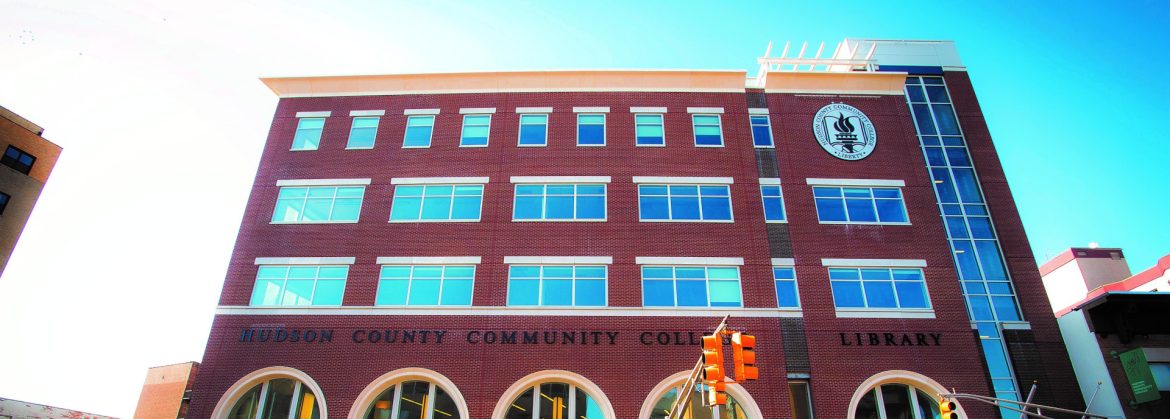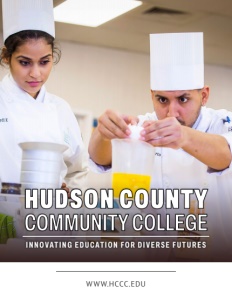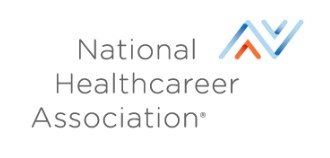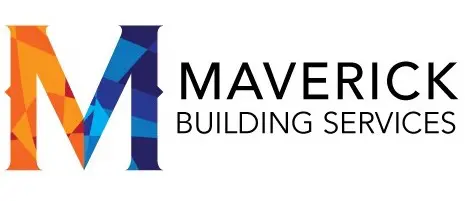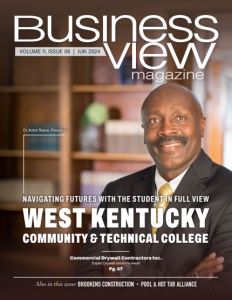Hudson County Community College
Innovating Education for Diverse Futures
Supporting student success through cutting-edge programs, strategic partnerships, and a deep commitment to diversity and inclusion.
Hudson County Community College (HCCC), a bastion of opportunity and transformation, is located in the heart of Jersey City, overlooking the Hudson River. Under the leadership of Dr. Christopher Reber, who is now in his seventh year as president, the college has embraced its mission to provide an accessible gateway to higher education for the residents of Hudson County and beyond.

Dr. Christopher Reber
Dr. Reber highlights the unique location of HCCC: “We’re not just any college, we’re in the shadow of the Statue of Liberty, a symbol of freedom and opportunity that we see from our Journal Square campus. That’s the essence of our mission.” HCCC serves approximately 20,000 students annually, with about an equal split of credit and non-credit students. The institution prides itself on being a diverse, urban, comprehensive community college, drawing students from all walks of life.
The student body at HCCC is exceptionally diverse, with approximately one-third of the students born outside the United States. “More than one thousand of our students begin here in English as a second language,” Dr. Reber notes, highlighting the college’s role in supporting newcomers to the country. Many of these students are the first in their families to attend higher education, and they often juggle full-time jobs and parenting responsibilities while pursuing their studies. “Two-thirds to three-quarters of our students face significant challenges such as housing insecurity, food insecurity, and sometimes homelessness,” he adds, emphasizing the resilience and determination of the student population.
Despite these hurdles, HCCC students achieve remarkable success. They transition to prestigious universities, including Ivy League institutions and Research One universities, and some return to the community with advanced degrees. Dr. Reber highlights the college’s commitment to student success, explaining, “We’re focused on getting all of our students to the finish line. That means partnering with them to remove barriers and help them navigate life challenges while earning a degree.”
HCCC has implemented two key strategic planning priorities to support this mission: student success; and diversity, equity, and inclusion (DEI). The college community uses data and best practices to remove obstacles and support students in completing their degrees. Additionally, the Hudson Helps Resource Center provides a comprehensive array of wraparound services to address the holistic needs of the students.
The commitment to DEI is evident in the demographics of the student body, with 87% identifying as BIPOC (Black, Indigenous, People of Color) and 56% as Latino or Hispanic. “Jersey City is the most diverse city in the United States,” Dr. Reber notes, “and that rich diversity is integral to providing the education our students deserve.”
Innovative Programs and Industry Partnerships
Hudson County Community College prides itself on diverse programs and partnerships designed to align with the demands of the modern workforce. The college is organized into five schools—Humanities and Social Sciences; STEM; Business, Culinary Arts and Hospitality Management; Nursing and Health Professions; and Continuing Education and Workforce Development – and offers cutting-edge programs across disciplines.
Dr. Reber elaborates on the structure, saying, “Each school has skilled, dedicated and caring faculty and staff serving a large number of students in academic programs.” The emphasis on labor market demand and real-world pathways is paramount.
Dr. Heather DeVries, Associate Vice President for Academic Affairs and Assessment, notes, “We try to ensure labor market demand in developing new programs and embed certificates and industry-recognized credentials in our degree programs, providing students with various pathways to enter the workforce.”
A standout feature is the Bloomberg Finance Lab, integrated into the business curriculum. Dr. Reber highlights, “Our business program thrives on partnerships. We’ve collaborated with JPMorgan Chase, Goldman Sachs, and many regional businesses to ensure our programs are relevant to industry needs.” The Bloomberg Finance Lab offers students real-world financial data, enhancing their learning experience.
Cybersecurity is another rapidly growing program at HCCC. According to Dr. Reber, “Cybersecurity is focused on cutting-edge technology and the nation’s Homeland Security needs. Our program is licensed and certified at the federal level, ensuring relevance.” He also highlights the program as a center of excellence in cybersecurity, emphasizing collaboration with federal agencies and the private sector.
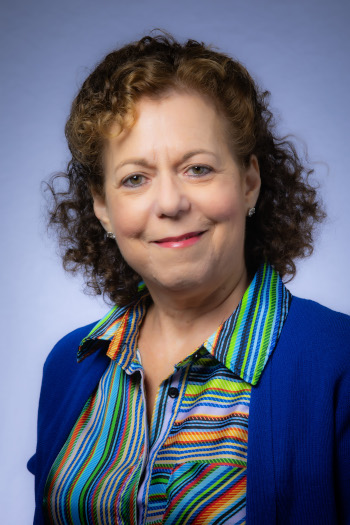
Associate Vice President for Continuing Education and Workforce Development Lori Margolin
Dr. Reber shares a recent milestone: “We celebrated a $1.75 million grant from the U.S. Department of Labor to invest in our Gateway to Innovation program, led by Associate Vice President for Continuing Education and Workforce Development Lori Margolin.” Margolin adds, “This grant will help us expand our workforce programs in financial services and technology that are provided to Hudson County residents at no cost.”
HCCC’s commitment to technology and workforce development is evident in its ongoing efforts to stay ahead of industry trends. Margolin underscores, “We assist students from day one until they’re off and running in their careers. This new grant will expand our work in these fast-growing sectors tremendously.”
Tailoring Education to Industry Needs
Hudson County Community College demonstrates its strength in aligning academic programs with industry demands, effectively bridging gaps in the labor force. Dr. Reber illustrates this with a partnership case study involving Eastern Millwork, a Jersey City-based company specializing in high-end millwork for prestigious clients like Goldman Sachs and the Kennedy Center.
“Andrew Campbell, the principal, needed a workforce skilled in creativity and manufacturing,” he explains. Eastern Millwork was struggling to find employees who could merge sophisticated design with hands-on manufacturing. The company was unsuccessful in exploring educational partnerships with several colleges and universities to help address this need.
Dr. Reber continues, “They were looking for educational partners who could provide a workforce trained in both creative and technical skills.” Traditional programs didn’t fit the bill, so HCCC took the initiative to design a curriculum tailored explicitly to Eastern Millwork’s needs. This collaboration led to the creation of new associate degree programs in construction management and advanced manufacturing, including a woodworking track designed around Eastern Millwork’s state-of-the-art requirements.
Governor Phil Murphy lauded this program as the blueprint for New Jersey’s future technical training, highlighting its apprenticeship model. Dr. Reber explains, “Eastern Millwork recruits students into our woodworking track, hiring them as employees from day one. These students earn competitive wages and full benefits while pursuing their degree.” The integration of academic schedules and workplace training ensures a seamless learning experience.
Students complete their associate degree at HCCC within three years and then transition to Thomas Edison State University for a bachelor’s degree in woodworking, all funded by Eastern Millwork. “The students develop skills that can lead to six-figure salaries and beyond,” Dr. Reber notes. This model fulfills Eastern Millwork’s workforce needs and provides students with valuable career training and opportunities.
Transforming Student Success: The Hudson Scholars Program
Hudson County Community College has innovatively addressed student retention and success through the Hudson Scholars Program, an initiative inspired by the college’s long-standing Educational Opportunity Fund (EOF). Dr. Reber highlights the origins and expansion of this initiative.
“Our entire college community is focused on getting our students to the finish line – removing barriers and helping students complete credentials that lead to life-changing opportunities,” he states. Pre-pandemic, HCCC partnered with Achieving the Dream, a national organization of high-achieving community colleges that focus on data and best practices to remove barriers, address equity gaps, and help all students achieve their goals.
Dr. Reber points out the success of New Jersey’s EOF program, which serves around 200 HCCC students each year who are most at risk for not completing their studies. “Despite significant financial and personal challenges, EOF students complete degrees at three times the rate of their non-EOF peers,” he says. This success is attributed to the program’s four pillars: personalized academic counselors, financial stipends, an early alert system, and high-impact practices.
The pandemic provided an opportunity to expand this model. Using federal stimulus funds, HCCC tested the efficacy of scaling the EOF model to a broader student population. Dr. Reber explains, “We hired ten full-time academic counselors, providing the same support to 2,500 students through the Hudson Scholars Program. The outcomes have been as great or greater than we’ve historically achieved through EOF.”

Dr. Gretchen Schulthes, Associate Dean of Advisement
Dr. Gretchen Schulthes, Associate Dean of Advisement, played a pivotal role in this rapid expansion. “As the idea surfaced during the pandemic, Gretchen quickly got this up and running, bringing 800 new students into the program in fall 2021 with very little advance notice,” Dr. Reber says. Dr. Schulthes and her colleague in institutional research and planning, John Urgola, have been instrumental in developing, growing, and measuring the program’s impact.
Dr. Schulthes emphasizes the personalized support offered through the program. “Our academic counselors have low caseloads, allowing them to know each student personally and help them navigate challenges,” she explains. The financial stipends, early alert system, and high-impact practices reinforce this support, creating a solid community and fostering student success.
Investing in Infrastructure and Technology
Hudson County Community College continues to enhance its infrastructure, prioritizing state-of-the-art technology and modern facilities to support its diverse student body and academic programs. Dr. Reber discusses the significant technology upgrades made during the pandemic.
“We invested millions of dollars in immersive telepresence video (ITV) technology, installing it in over 60 classrooms and meeting spaces across our campuses,” he explains. This advanced technology creates an interactive and high-quality virtual learning environment, enabling students to participate in live classes almost as if they were physically present. “We can now connect under-enrolled sections of courses across our campuses, enhancing and expanding our program offerings,” he adds.
Trisha Clay, Associate Vice President for Information Technology and Chief Information Officer, elaborates on the foresight that placed HCCC ahead of the curve. “In 2019, Dr. Reber asked me to form a task force to explore immersive video connections, which proved serendipitous when the pandemic hit,” she notes. The college now boasts over 60 ITV-equipped locations, supported by various grants and county appropriations. Clay emphasizes the importance of cybersecurity in these advancements, stating, “We’ve integrated security into everything we do, recognizing the vulnerabilities faced by our first-generation students and English language learners.”
Dr. Reber also highlights HCCC’s long-standing collaboration with Hudson County, which has facilitated the construction of nationally distinctive facilities. “Our library, which won the Association of College and Research Libraries Excellence in Academic Libraries Award in 2016, and our comprehensive Culinary Conference Center, are among the most advanced academic facilities in the nation,” he mentions. The college’s state-of-the-art STEM building opened in 2017 and offers specialized facilities for various STEM disciplines, co-locating faculty, classrooms, and labs to foster an integrated learning experience.
The newest project, an 11-story Center for Student Success currently under construction, epitomizes HCCC’s commitment to modern, multifunctional spaces. “This 160,000-square-foot facility will house high-tech classrooms, a one-stop location for student services, a gymnasium, a wellness center, a university center, and a black box theater,” Dr. Reber elaborates. Expected to open in fall 2026, this facility will replace older buildings that have been sold to help fund the new construction.
Prioritizing Student Success and Diversity
Hudson County Community College remains steadfast in its focus on student success; and diversity, equity, and inclusion (DEI). As the college completes its 2021-24 strategic plan and begins planning for the next five years, these priorities will continue to guide efforts to enhance educational outcomes and support for all students.
Dr. Reber outlines the college’s goals, emphasizing, “We want to continue moving the needle on student retention and reduce the time it takes for students to earn credentials and achieve their goals.” A vital component of this strategy is improving transfer rates, an area where HCCC has made significant strides through its partnerships with neighboring New Jersey City University (NJCU), Saint Peter’s University, and other institutions.
Dr. Reber elaborates on a new partnership with NJCU: “We developed HCCC-NJCU CONNECT, a model based on national best practices that offers seamless transfer pathways for our students.” This initiative resulted from a collaborative project with the Aspen Institute and the American Association of State Colleges and Universities (AASCU). “We now have up to 40 transfer pathways between Hudson and NJCU, ensuring that every credit a student earns at Hudson transfers directly to their aligned baccalaureate degree at NJCU, which can be earned with successful completion of no more than 120 total credits,” he explains.
Dr. Reber also highlights the benefits of the University Center in the new Center for Student Success, which is currently under construction. “This Center will provide classroom and advising spaces for four-year institutions to offer junior- and senior-level courses on our campus,” he explains. This setup will allow students to complete their baccalaureate programs in a familiar environment, further easing the transfer process.
By cementing strong partnerships and creating innovative support structures, Hudson County Community College is making higher education more accessible and effective for its diverse student body. Dr. Reber concludes, “Our students love this institution and often say, ‘Hudson is Home!,’ which has become the college’s tagline. We aim to make their journey from Hudson to a four-year degree as seamless and supportive as possible.”
AT A GLANCE
Hudson County Community College
What: Urban comprehensive community college offering diverse educational programs and partnerships
Where: Jersey City, New Jersey
Website: https://www.hccc.edu/index.html
PARTNERS
MAST Construction Services, Inc. – www.mastconstruction.com
MAST Construction Services, Inc. is an award-winning owner’s representative, project and construction management firm. The Little Falls, NJ-based company has completed more than 200 projects on behalf of its public and private sector clients. MAST specializes in working in several sectors, including educational, recreational, transportation, governmental and justice.
Trane Commercial – www.trane.com
Trane, a Trane Technologies brand, is a building technology and energy solutions leader with well over a hundred years of experience, that deploys a depth and breadth of knowledge, backgrounds, and perspectives to innovate new technologies and individualize solutions that get it right for buildings today and the world tomorrow.
National Healthcareer Association – https://www.nhanow.com/
National Healthcareer Association (NHA) is building the next generation of allied health professionals. Since 1989, we have helped over 1.25 million people access a better future. Our proven learning solutions, industry-recognized credentials and superior customer care elevate the learning experience and give customers, learners, and allied health professionals the confidence to succeed and drive positive outcomes.
Aspire Technology Partners – https://www.aspiretransforms.com/
Aspire Technology Partners is a premier technology services firm specializing in the delivery of digital infrastructure solutions and managed services designed specifically to support and achieve the business goals of our clients. Our team of world class experts take the time to understand your business initiatives and align technology solutions to drive business forward.
Allied Universal – https://www.aus.com/
Allied Universal® is the world’s leading security services provider and trusted partner to more than 400 of the FORTUNE 500. With operations in more than 100 countries, Allied Universal is the third largest private employer in North America and seventh in the world. Annual revenue is more than $20 billion.
Ellucian – https://www.ellucian.com/
Ellucian powers innovation for higher education, partnering with more than 2,900 customers across 50 countries, serving 22 million students. Fueled by decades of experience with a singular focus on the needs of learning institutions, the Ellucian platform features best-in-class SaaS capabilities and delivers insights needed now and into the future.
